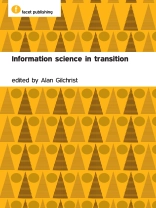Are we at a turning point in digital information? The expansion of the internet was unprecedented; search engines dealt with it in the only way possible — scan as much as they could and throw it all into an inverted index. But now search engines are beginning to experiment with deep web searching and attention to taxonomies, and the Semantic Web is demonstrating how much more can be done with a computer if you give it knowledge. What does this mean for the skills and focus of the information science (or sciences) community? Should information designers and information managers work more closely to create computer based information systems for more effective retrieval? Will information science become part of computer science and does the rise of the term informatics demonstrate the convergence of information science and information technology — a convergence that must surely develop in the years to come?
Issues and questions such as these are reflected in this monograph, a collection of essays written by some of the most pre-eminent contributors to the discipline. These peer reviewed perspectives capture insights into advances in, and facets of, information science, a profession in transition.
With an introduction from Jack Meadows the key papers are:
- Meeting the challenge, by Brian Vickery
- The developing foundations of information science, by David Bawden
- The last 50 years of knowledge organization, by Stella G Dextre Clarke
- On the history of evaluation in IR, by Stephen Robertson
- The information user, by Tom Wilson
- The sociological turn in information science, by Blaise Cronin
- From chemical documentation to chemoinformatics, by Peter Willett
- Health informatics, by Peter A Bath
- Social informatics and sociotechnical research, by Elisabeth Davenport
- The evolution of visual information retrieval, by Peter Enser
- Information policies, by Elizabeth Orna
- Disparity in professional qualifications and progress in information handling, by Barry Mahon
- Electronic scholarly publishing and open access, by Charles Oppenheim
- Social software: fun and games, or business tools?, by Wendy A Warr
- Bibliometrics to webometrics, by Mike Thelwall.
This monograph previously appeared as a special issue of the Journal of Information Science, published by Sage.
Readership : Reproduced here as a monograph, this important collection of perspectives on a skill in transition from a prestigious line-up of authors will now be available to information studies students worldwide and to all those working in the information science field.
Содержание
Preface — Alan Gilchrist
Editorial — Alan Gilchrist
Guest Editorial: Meeting the challenge — Brian Vickery
1. Fifty years of UK research in information science — Jack Meadows
2. Smoother pebbles and the shoulders of giants: the developing foundations of information science — David Bawden
3. The last 50 years of knowledge organization: a journey through my personal archives — Stella G. Dextre Clarke
4. On the history of evaluation in IR -Stephen Robertson
5. The information user: past, present and future — Tom Wilson
6. The sociological turn in information science — Blaise Cronin
7. From chemical documentation to chemoinformatics: 50 years of chemical information science — Peter Willett
8. Health informatics: current issues and challenges — Peter A. Bath
9. Social informatics and sociotechnical research – a view from the UK — Elisabeth Davenport
10. The evolution of visual information retrieval — Peter Enser
11. Information policies: yesterday, today, tomorrow — Elizabeth Orna
12. The disparity in professional qualifications and progress in information handling: a European perspective — Barry Mahon
13. Electronic scholarly publishing and Open Access — Charles Oppenheim
14. Social software: fun and games, or business tools? — Wendy A. Warr
15. Bibliometrics to webometrics — Mike Thelwall
16. How I learned to love the Brits — Eugene Garfield
Об авторе
Alan Gilchrist DLitt CMC FIMC Hon FCLIP undertakes consultancy projects in the private and public sectors and for international organizations, and operates his own consultancy company, Cura Consortium. He was the Founding Editor, and is now Editor Emeritus, of the Journal of Information Science.












